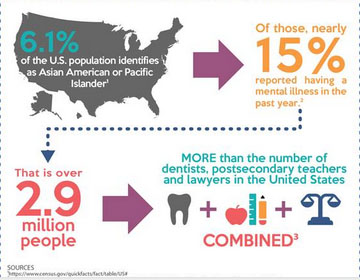This week’s Wellness Wednesday focuses on Asian, Pacific Islander, and Desi American (APIDA) Mental Health. It’s important to recognize (and consider when addressing mental health) that this community encompasses a wide range of countries, ethnicities, nationalities, and identities. Each of which has their own unique identities and challenges. Additionally, folks in the APIDA community face years of trauma and discrimination including the “Model Minority” Myth, Japanese internment, “perpetual foreigner” stereotyping, and most recently, discrimination during Covid-19. Here are some facts:
- Feeling responsible, yet unable to meet biased and unrealistic standards set by families and society, contributes to low self-esteem among Asian-American women
- Language barriers make it difficult for Asian Americans to access mental health services. Discussing mental health concerns is considered taboo in many Asian cultures. Because of this, Asian Americans tend to dismiss, deny, or neglect their symptoms
- Of APIDA adults with a mental illness, 73.1 percent did not receive treatment compared to 56.7 percent of the overall population
For more facts, information, and resources, you can see the links below.
Resources (not an exhaustive list):
- Overview of APIDA Community Mental Health
- Asian American Psychological Association (AAPA)
- Asian & Pacific Islander American Health Forum
- National Asian American Mental Health Association
- National Asian Women’s Health Organization
- Asian American Health Initiative
- BIPOC Mental Health during Covid
- Brown Girl Therapy
- South Asian Mental Health Initiative & Network
- Houston: Hope Clinic
- Houston: Asian American Health Coalition
By Gustavo Molinar, Mental Health Literacy Specialist


